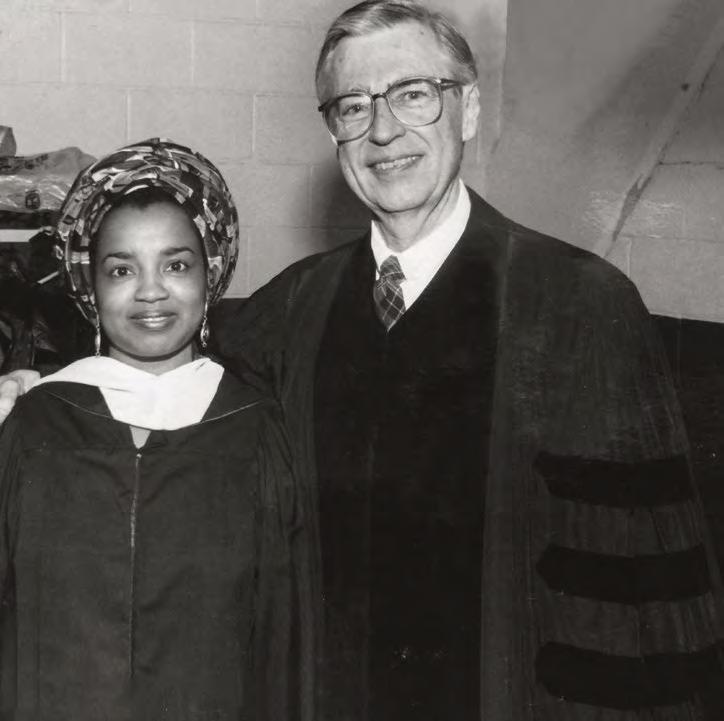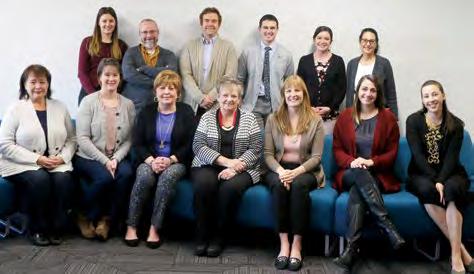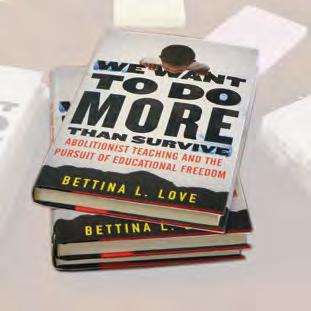
5 minute read
Carrying on Mister Rogers’ Legacy
Carrying on Mister Rogers’ Legacy Written by Cassia Crogan
Aisha White, director of the P.R.I.D.E. Program, with Fred Rogers before introducing him as the speaker at her 1993 Pitt commencement ceremony When the movie “A Beautiful Day in the Neighborhood” starring Tom Hanks hit theaters this past November, it renewed the world’s wonder and appreciation for the work of the late Fred Rogers. The School of Education has a long history with and unwavering dedication to Rogers’ teachings and his immeasurable contributions to education and child psychology. His impact is realized across the classroom and in the community.
Years ago, the young daughter of Lugene Calderone, an adjunct professor at the School of Education, inspired her to write a letter to Fred Rogers. To her surprise, she received two letters back: one from Rogers and one from producer Hedda Sharapan, who graduated from the University in 1967 with a major in child development and care. A friendship was born.
For the past 10 years, Calderone has organized a classroom visit for her course Language and Literacy for the Young Child with Sharapan; fellow show producer Margy Whitmer; and Mister Speedy Delivery himself, David Newell.
During the course, the effects of technology on early childhood literacy, such as the medium of television, are researched and discussed. Sharapan and Whitmer explore the impact of Rogers' philosophy on young children and learning.
“My students were enthralled with each and every presentation throughout these years,” says Calderone. “Recently, revisiting those experiences has ignited a newfound interest in these young students, who may not have ever seen the series. And the international students are mesmerized by our own private Pittsburgh phenomenon.”
One student who took a particular interest in Rogers’ work is Madhumita Mahesh, who earned her teacher education minor through the School of Education. As a child, Mahesh watched “Mister Rogers’ Neighborhood” with her mother, who used the show to practice her English after immigrating to the United States from India. Mahesh’s passion for
his work only grew when she met Sharapan, Whitmer, and Newell in class.
“I was so taken with them and their dedication to the show and the culture it had created,” said Mahesh. “It was partially that I was such a big fan and I had spent so much of my childhood feeling that I knew them that when I was able to meet and talk to them, it really felt like a reunion.”
As a school and community-based service coordinator in the Prevention Program at Familylinks, Mahesh conducts therapeutic sessions at various Pittsburgh public schools. She works with school counselors to address many topics that Rogers’ show focused on: self-esteem, bullying, anger management, grief and loss.
“I am able to think about how Mister Rogers would have handled situations,” says Mahesh. “Oftentimes, educators teach down to the students, but I approach a session as an opportunity to learn from them as much as they can learn from me.”
Mahesh also was able to see herself on the silver screen. She was cast as an extra in the new movie when it was filmed in Pittsburgh.
Bringing the Legacy to Life
Aisha White, director of the P.R.I.D.E. (Positive Racial Identity Development in Early Education) Program in the School of Education’s Office of Child Development, worked for Family Communications, Inc. in the 1990s and 2000s as the director of the Mister Rogers’ Neighborhood Childcare Partnership.
“My office was less than 10 feet away from Fred’s, so I would see him when he came in to work as well as during meetings,” says White. “He was the same person you saw on his program or in any other setting: unassuming, thoughtful, soft spoken, and genuine.”
Today, White works as a parttime consultant on “Daniel Tiger’s Neighborhood,” an animated children’s television series based on “Mister Rogers’ Neighborhood.” White supports the development of episodes and provides advice on program scripts.
White’s colleague, Shannon Wanless, director of the school’s Office of Child Development, also consults for the program.
School of Education faculty and staff wear cardigans in honor of Mister Rogers on World Kindness Day in November.

“Every single project we do at the Office of Child Development, in a way, lives and breathes the Fred Rogers legacy. We honor child development the same way he did in his work,” says Wanless. “Just like Fred did, we are constantly checking to make sure we are being true to theory and research about children.”
Rogers had a long friendship and professional relationship with the late Pitt child psychologist Margaret McFarland. But first he was a student in McFarland’s early childhood development class at Pitt. School of Education Professor emeritus Karen VanderVen was also a student in McFarland’s class and recalls impassioned discussions about the extent to which creative play should be structured in early childhood education.
VanderVen and current Pitt Education faculty member Cindy Popovich, who was a graduate student at the time, were present for many of Rogers and McFarland’s weekly meetings.
Later, VanderVen started an arts and crafts program at UPMC Western Psychiatric Hospital, where she applied what she learned in McFarland’s class to her work in the community. Popovich, meanwhile, has incorporated the principles discussed in the class to the applied developmental psychology courses she has taught at the School of Education during the past 18 years. Today and Tomorrow
From 1968 to 2001, Rogers covered a wide range of topics that always seemed to be addressed just at the right time. Now, almost 20 years after the final episode of “Mister Rogers’ Neighborhood,” what would he focus his show on today?
“What Mister Rogers talked about for years in his programs is very similar to what we are talking about now as key to creating equitable schools for all children and for having highly effective teachers in those schools,” says Anna Arlotta-Guerrero, program director of the Combined Accelerated Studies in Education (CASE) program. “Many of his shows discussed love, respect, treating everyone kindly, and being a part of your community or neighborhood. We teach these same approaches today to CASE students.”
Arlotta-Guerrero believes that the biggest difference in Rogers’ show today would be a focus on equity in e ducation and making sure that there was equal representation from Black communities and from other communities of color.
“I believe if he were alive today, he would be a champion of helping his audience realize that many children live in poverty and that racism causes trauma,” says Arlotta-Guerrero.
By listening to and applying the values of Rogers, the School of Education is educating the next generation to make “the neighborhood” a little more beautiful and equitable for all. ◆








